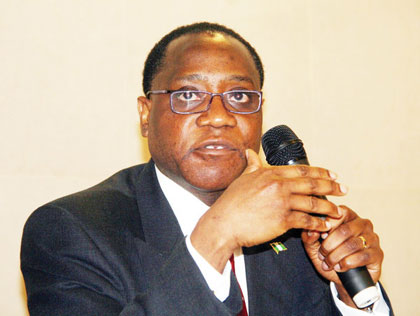The Federal Government of Nigeria made it public yesterday that the country had a huge and improved turnover in terms of its import trade figures, seeing that it saved up to N4.2 trillion thanks to a reduction in the rate of importation of manufactured goods in the year 2012.
Mr. Olusegun Aganga, the honourable Minister of Industry, Trade and Investment, made the announcement during the opening ceremony of the ministerial session of the National Council on Industry, Trade and Investment in Ibadan.
At the meeting with the theme, “Industrialisation as the Driver of Economic Development, Revenue Diversification and Wealth Creation,” the honourable Minister stated that with importation of goods such as textile, cement and vegetable oil minimized, the country saved about N817 billion within the same period.
He said: “In terms of trade, we have done very well. Nigeria’s external trade fell by 4.3 per cent, from N29 trillion to about N28 trillion in 2012. However, the good and exciting news is that the fall was as a result of a sharp decrease in the value of import from about N9.8 trillion to about N5.6 trillion by the end of 2012.
“That was a decrease of about 43 per cent in savings of more than N4.2 trillion which has gone to the increase in the foreign reserves of our country.
“The last time that we had such a big fall in import, for a country that is largely import dependent, was in 2008 and that fall was about N1trillion. This shows in real sense, a decreasing over-reliance on import for domestic consumption and a significant savings on our foreign exchange. That is why foreign exchange is going up.
“Specifically, for vegetable oil production, import fell from about N1 trillion to about N577 billion; textile imports fell from about N190 billion to N94 billion, representing about 82 per cent decrease; while cement import fell from about N219 billion to about N27 billion. In total, these three sectors only contributed to more than N817 billion to our foreign reserves because we are less dependent on import.”
Aganga noted that Nigeria, within the last seven years also made an improvement in non-oil revenue earnings with the non-oil sector in 2012 accounting for 30 per cent of the nation’s revenue earnings, as against 15.5 per cent recorded in 2005.
He said: “Now, if you look at our exports, it has gone up by 15.5 per cent, from about N19.4 trillion to about N22.4 trillion in 2012. In terms of oil and non-oil revenue, in 2005, oil revenue contributed about 94 per cent of our foreign earnings while the non-oil sector contributed only six per cent.
“If you look at the same statistics in 2012, the oil sector contributed about 69 per cent while the non-oil sector contributed 30 per cent. Following this massive improvement, which tends to lay a hand in diversifying the nation’s economy, provide jobs and acquiring of wealth, the minister said his ministry had begun the implementation of its Nigerian Industrial Revolution Plan, based on areas where the country had comparative and competitive advantage.
“Nigeria has huge human and natural resources that are yet to be fully translated into wealth for our citizens. For decades, we have relied heavily on the oil and gas sector, which obviously has generated a lot of revenue for the federal and state governments, but it is capital intensive and less inclusive. But the good news is that today, we have started reversing that process by developing an Industrial Revolution Plan,” he said.
He went on to reveal how committed the Federal Government was to partner with State Governments on creating a sustainable enabling environment for attracting and retaining local and foreign investments across the country.
The Governor of Oyo State, Senator Abiola Ajumobi, in his opening remarks said the state was in line with the collaboration in order to transform the state. He said: “The role of industrialisation as the pivot for economic development and transformation cannot be over-emphasised. We acknowledge the minister’s achievements and passion towards industrialising Nigeria and we are ready to partner the federal government in making Oyo State the hub of industrialisation in Nigeria.”




 Premier League
Premier League